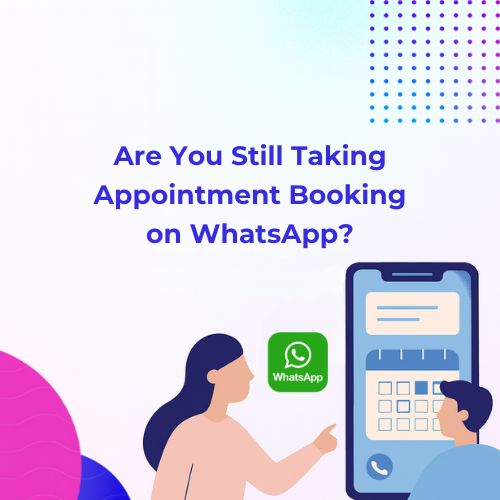Table of Contents
Are You Still Taking Appointment Bookings on WhatsApp?
Is your WhatsApp inbox full of booking requests, customer questions, missed messages, and last-minute reschedules?
You’re not alone. Many small businesses, from beauty salons to auto repair shops and personal trainers, start off using WhatsApp for appointment bookings because it’s simple, accessible, and familiar. After all, your customers are already there. Why not make it easy for them?
But as your business grows, so do the cracks in this system.
At KlikNRoll, we’ve worked with countless service-based businesses who once thought WhatsApp was “good enough”, until their manual booking chaos, missed appointments, and lack of automation started costing them time, money, and customers.
So here’s the question: Is WhatsApp really helping your business grow, or holding it back?
Let’s dive into the real-world scenarios and challenges many businesses face when managing appointments via WhatsApp, and what smarter alternatives exist today.
The Rise of WhatsApp for Bookings
It’s easy to see why so many small and service-based businesses adopted WhatsApp for appointment booking in the first place. It’s free, easy to use, and already integrated into how customers communicate daily. For a solo hair stylist, massage therapist, or fitness trainer just starting out, booking appointments via WhatsApp feels like a no-brainer. No new apps to install, no steep learning curves, and no upfront costs.
In fact, in industries like salon appointment software, clinic scheduling, and fitness class booking, WhatsApp became the go-to workaround when traditional systems felt too complex or expensive. You could manage bookings, answer customer questions, and even confirm services, all from a single app.
For many, it seemed like a win-win. Customers appreciated the personal touch, and business owners felt in control, at least at first.
But as businesses scale, this approach starts to show its age.
Managing a few clients manually in a chat app is one thing. Handling dozens of requests daily, juggling service options, and trying to prevent booking miscommunication is another. And when your business starts depending on WhatsApp as your primary scheduling tool, limitations begin to surface.
The reality is, WhatsApp was never built to be a full-fledged booking system. It lacks calendar integration, payment options, automated reminders, and booking system features that help you run your business efficiently.
At KlikNRoll, we’ve worked with countless businesses who outgrew WhatsApp’s capabilities, but didn’t realize how much it was holding them back until they made the switch.
In the next section, we’ll walk through scenario-based problems businesses face when using WhatsApp for appointment scheduling, problems that go beyond just missed messages.
Booking Problems Businesses Face on Using WhatsApp
As your business grows, so do the cracks in your WhatsApp booking system. Below are real-world examples that show how relying solely on WhatsApp for appointment scheduling can create more problems than it solves.
Scalability Becomes a Nightmare
Imagine a popular beauty salon that started with 10–15 clients a week. In the beginning, manually confirming bookings over WhatsApp felt manageable. But now, with 50+ daily appointments, the WhatsApp inbox is overflowing with unread messages, late-night requests, and reschedule follow-ups.
Without calendar integration, there’s no visual view of what’s booked and when. Double bookings and scheduling conflicts become a weekly headache. Managing appointments on WhatsApp becomes a bottleneck instead of a solution.
No Automation = Time Drain
Take a car repair shop that handles dozens of clients per day. Staff spend hours responding to repetitive questions like:
- “Are you open tomorrow?”
- “Do you have a slot for Saturday?”
- “How much is the oil change service?”
No automated reminders, no instant replies, no smart forms. Just a lot of time wasted on manual typing. This manual booking challenge eats into productivity and leads to slower customer response times.
No Analytics or Booking History
A gym that offers group classes has no way to view patterns: Who’s coming regularly? Who cancels often? Are certain time slots under-booked?
Without booking analytics, you can’t make informed decisions about staffing or promotions. WhatsApp gives you conversations, not appointment tracking.
No Built-In Payments or Deposits
Consider a home cleaning service that accepts appointments via WhatsApp. Payment? That happens later, by bank transfer or cash. What happens when a customer cancels last minute or ghosts the appointment altogether?
Without payment integration, it’s difficult to enforce deposits or upfront fees. This leads to lost revenue and lack of customer commitment.
Risky Data Handling and Privacy Concerns
A wellness clinic using WhatsApp to schedule therapy sessions is unknowingly putting sensitive client information at risk. Unlike purpose-built clinic scheduling tools, WhatsApp does not offer GDPR-compliant or HIPAA-secure systems by default.
Customer data security and privacy regulations demand more than just convenience, they require responsible tools.
Multiple Staff, One Inbox
At a busy restaurant, three different staff members use the same WhatsApp Business account to manage reservations. No one knows who replied to which customer. Sometimes the same table is booked twice. Sometimes messages get seen but forgotten.
This shared-inbox chaos leads to booking miscommunication, errors, and ultimately, customer frustration.
Poor Booking Experience for Customers
A personal trainer offering multiple training plans has no structured way for clients to book services. Clients have to manually type:
“I want the 3x/week plan, preferably evenings after 6PM. Starting next Monday.”
Without self-service appointment booking, errors are common. There’s no clarity, no confirmation screen, and no way to see what’s actually available.
No Reminders = No Shows
A therapist schedules weekly sessions via WhatsApp. Clients often forget their appointments. The result? Empty slots, lost income, and disrupted scheduling.
Since WhatsApp doesn’t offer automated appointment reminders, there’s no system in place to reduce customer no-shows.
These aren’t just minor inconveniences, they’re real operational risks. And they’re all too common for businesses relying on WhatsApp to do more than it was designed for.
In the next section, we’ll break down what all of this is truly costing your business, beyond just time.
What’s the Cost of Convenience?
Using WhatsApp for appointment scheduling may feel like the simplest path, but over time, that simplicity starts to come at a cost. And it’s not just a matter of time or a few missed bookings.
Let’s break down the hidden toll your business might be paying:
Lost Time = Lost Revenue
Every manual reply, every back-and-forth message, every moment spent confirming appointments that could’ve been handled with an automated booking system, that’s time you’re not spending on growing your business or delivering your service.
Time is money. And when your schedule is buried inside a messaging app with no booking automation, you’re spending too much of it on things that should be running themselves.
Staff Burnout and Inconsistency
If your team shares the same WhatsApp Business account, the experience is rarely smooth. One person replies, another misses a message, and your customer is left waiting or confused. That constant inbox juggling leads to stress, errors, and booking miscommunication.
A proper scheduling software brings clarity and roles to the table. WhatsApp doesn’t.
Poor Customer Experience
Today’s customers expect frictionless booking. They want to choose a service, pick a time, and get a confirmation, all in under a minute. When they’re forced into long chat threads, unclear instructions, or waiting hours for a response, they may simply go elsewhere.
Your competitors using smarter appointment systems are already delivering that ease.
High No-Show Rates Without Reminders
Missed appointments mean lost income. Without automated reminders built into your scheduling flow, even loyal clients can forget their booking, especially when it was made days in advance via a casual WhatsApp chat.
Reducing customer no-shows requires structure, not memory.
Data Privacy Risks
You may not realize it, but collecting and storing sensitive information, names, contact details, even medical history, over WhatsApp can leave you exposed. Unlike specialized clinic scheduling tools or therapist booking systems, WhatsApp doesn’t offer built-in GDPR compliance or client data privacy protections.
Your customer trust and reputation are on the line.
At KlikNRoll, we believe convenience shouldn’t come at the cost of control. The truth is, WhatsApp was never designed to be a full-featured appointment system, and stretching it beyond its limits leads to frustration, inefficiency, and eventually, business bottlenecks.
In the next section, we’ll explore the smarter tools that can help you streamline your appointment flow, while still integrating with WhatsApp if needed.
Smarter Alternatives to WhatsApp Booking
If you’re ready to move beyond the chaos of chat-based scheduling, the good news is: you don’t have to abandon WhatsApp entirely, you just need the right tools to work with it, not against it.
Whether you run a salon, a clinic, or a home-based service, automated booking systems offer the structure, speed, and scalability that WhatsApp lacks. Let’s look at the most effective ways to streamline your appointment flow without losing the personal touch your customers love.
Online Booking Platforms That Work for You
There are dozens of easy-to-use platforms built specifically for service businesses. These systems offer:
- Self-service appointment booking: Clients choose their service, select a time, and confirm instantly, no back-and-forth.
- Automated reminders: Reduce no-shows with email or SMS alerts.
- Built-in payment integration: Collect deposits or full payments securely.
- Analytics and tracking: Know who’s booking, canceling, or rescheduling, get insights you can actually act on.
Some popular options include:
- KlikNRoll – Built specifically to help small businesses automate bookings, reduce no-shows, and stay organized, while still offering WhatsApp integration.
- Fresha – Great for salons and spas
- Booksy – Tailored for health and beauty professionals
- Setmore – Versatile and beginner-friendly
- Calendly – Clean and efficient, ideal for solo professionals
These platforms offer features that WhatsApp for business simply doesn’t, like calendar integration, client data security, and real-time availability views.
Use WhatsApp Smarter (With API & Chatbots)
If you’re not ready to move fully away from WhatsApp, that’s okay. You can enhance it with tools like the WhatsApp Business API and booking chatbots.
These integrations allow you to:
- Offer clickable booking menus right in the chat
- Automate responses to common questions
- Collect appointment info in a structured format
- Trigger confirmations and reminders directly in WhatsApp
This gives customers the familiar mobile-friendly booking experience they want, without putting the burden on you or your team.
KlikNRoll also offers seamless WhatsApp integration for businesses who still want to use it as a touchpoint, without all the manual effort.
Sync Your Tools, Save Your Time
Modern scheduling software can also sync with:
- Google Calendar or Outlook
- Email marketing tools
- CRMs and customer databases
This creates a complete workflow, from booking to follow-up, so you’re not manually copying appointments or chasing down customer info buried in chat logs.
Ultimately, whether you choose a standalone appointment system or integrate tools into WhatsApp itself, the goal is the same: reduce manual effort, deliver better customer experiences, and build a more efficient business.
In the final section, we’ll share practical steps to help you transition without disrupting your current flow, or losing your loyal customers.
Transitioning Smoothly – Tips for Business Owners
We get it, switching from a familiar system like WhatsApp to a new booking platform can feel like a big leap. Especially when you’re running a busy service business and don’t want to disrupt your day-to-day operations.
But the transition doesn’t have to be difficult. With the right steps, you can move to an automated booking system without confusing your customers or losing the personal touch they love.
Here’s how we recommend making the shift, based on what’s worked for other KlikNRoll users:
Start with a Hybrid Approach
You don’t need to turn off WhatsApp overnight. Instead, use it alongside your new appointment system during a short transition period.
For example:
- Add your booking link to your WhatsApp auto-reply or business profile.
- When someone messages you to book, guide them to your self-service appointment booking page.
- Continue to confirm or follow up through WhatsApp for a personal touch, while the scheduling itself runs in the background.
This hybrid method helps ease your clients into the new experience while reducing your own manual workload.
Communicate Clearly with Your Clients
People resist change when they’re surprised by it. So be proactive.
Let your customers know:
- Why you’re making the change (“to reduce double bookings and serve you better”)
- How it benefits them (easier booking, instant confirmation, fewer no-shows)
- Where they can now book (include your booking link in every message and on your social media)
You can even use WhatsApp to send a quick broadcast message or post a status update with the announcement.
Make the Booking Link Visible Everywhere
Wherever your brand shows up online, your booking system should too:
- Instagram bio
- Facebook page
- Google Business profile
- Website
- WhatsApp auto-responder
The easier you make it to book, the more likely customers are to follow through, especially on mobile.
Integrate and Automate
As you settle into your new tool, explore features like:
- Calendar integration (e.g., Google Calendar)
- Automated reminders (via email or WhatsApp)
- Client data tracking for repeat bookings
- Payment integration to secure appointments upfront
If you’re using KlikNRoll, these features are already baked in to help you run your business efficiently, with or without WhatsApp.
Focus on the Long-Term Benefits
Yes, there’s a small learning curve at first. But once you switch, you’ll wonder how you ever managed without it. The goal isn’t to replace your personal connection with customers, it’s to free up your time and reduce friction on both sides.
You’re not just switching tools. You’re upgrading your business.
Conclusion: Don’t Let Your Inbox Run Your Business
WhatsApp is great, for chatting, quick check-ins, and personal service. But when it comes to appointment scheduling, it simply wasn’t built to scale. What once felt like a smart, convenient shortcut can quickly become a source of missed bookings, delayed responses, customer no-shows, and operational stress.
We’ve walked through the real-world scenarios: from manual booking challenges and lack of payment integration, to poor booking experiences and data privacy concerns. These aren’t just small annoyances, they’re signs that your business needs a smarter, more structured approach to managing appointments.
At KlikNRoll, we’re not here to tell you to ditch WhatsApp entirely. In fact, we believe in using it more effectively, alongside tools that help you automate your scheduling, reduce errors, and create a better experience for everyone involved.
So here’s the big question:
Are you still taking appointment bookings on WhatsApp?
If so, it might be time to take a step back and ask: is it really working for your business, or is it just the way things have always been done?
Make the move. Streamline your process. Save time. And let your business grow without being chained to your inbox.
KlikNRoll is here to help you get there.

Hey there! I’m Jeffrey Hau, and my journey in the digital world started after I wrapped up my psychology degree at UCLA. Imagine coming back to the bustling streets of Hong Kong from the tech haven of Silicon Valley – it was a whirlwind of inspiration! Seeing how social media platforms were evolving at breakneck speed and realizing the limitations of traditional advertising in this digital age, I decided to dive in.
In 2012, I laid the foundation of Prizm Group. From our humble beginnings, we’ve now blossomed into a global powerhouse with a team of over 200 passionate professionals. Our HQ is right here in Hong Kong, and we’ve spread our wings to SG, AU, NZ, JP, and China.
As a digital problem solver, our team found that several industries are in need of reservation systems, especially for F&B, Hotels, Beauty, and Medical sectors. Our digital magicians started crafting reservation systems tailored to cater to these specific needs. We extended our expertise to e-commerce, voucher management systems, and campaign management systems, combining them into KlikNRoll – an all-in-one solution. We deep dive into various industries, understanding their unique challenges and developing innovative solutions.
We’re not just a company; we’re your dedicated partners in transforming how you navigate the digital landscape. Our passion lies in providing businesses with intuitive and tailored solutions using KlikNRoll’s powerful capabilities.
Ready to embark on this exciting digital adventure with us? Let’s make your brand stand out in the digital jungle!







